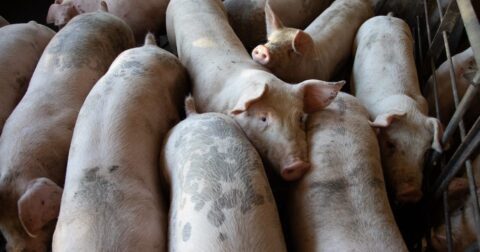News
Tree Bark Microbes Capture Greenhouse Gases, New Study Finds
Research•5 min read
Reported
The automated emotion recognition tool can apparently be used to assess pig welfare on farms. But advocates say it is too little too late.


Words by Ingrid L. Taylor
Researchers at the University of Copenhagen are developing an automated emotion recognition tool that they claim can be used to assess pig welfare on farms. Lead researcher Elodie Briefer thinks this technology can be an important tool for determining positive welfare in animals, which looks beyond just the alleviation of suffering to how animals can have more fulfilled lives.
“Animals need to thrive,” says Briefer in an interview with Copenhagen University, “It is not enough that they are in good physical shape or you reduce negative emotions.”
To create the technology, researchers collected previously recorded vocalizations from pigs in past studies. From this data, they selected 7,414 pig calls from some of the more disturbing moments in the pigs’ lives. The data included a 2015 experiment in which piglets were placed on their backs and forcibly held down to record their reactions. In other experiments that were used, piglets were subjected to castrations without anesthesia or pain medications and recorded as they were waiting to be slaughtered, kept in social isolation, or held in small boxes.
Briefer’s team also documented calls associated with positive and negative emotions by placing piglets in completely barren environments and comparing their vocalizations to piglets who were given bedding and toys.
Based on their findings, Briefer claims they can create an automated real-time monitoring system that will let farmers know when their animals are experiencing positive or negative emotions.
Dr. Marc Bekoff, professor emeritus of Ecology and Evolutionary Biology at the University of Colorado and author of The Emotional Lives of Animals, is not convinced that the technology will help improve the animals’ lives. In fact, he says there are already decades of research attesting to the fact that animal welfare in food production systems is poor.
“We’ve had these data for decades,” says Bekoff, “Having a new method to measure emotions doesn’t mean much for the individual animals who are still being killed and eaten.”
Bekoff is concerned that the development of new technologies like Briefer’s won’t foster a better understanding of animal emotions. Instead, he believes they will contribute to humane washing, a practice used by agribusinesses to promise improvements to animal welfare without bringing about substantive change.
“Farmers may adopt technology like this with good intentions, but it can lead people down a path that continues to justify serious and inexcusable harm to animals,” he says.
Dr. Lori Marino, neuroscientist and director of the Kimmela Center for Animal Advocacy, agrees. She notes that this technology would only be an important advancement if its use translated to significant changes in the way pigs are treated. “No animal can thrive on factory farms,” she says.
Marino points out that testing welfare is not the same as providing it. She also echoes Bekoff’s concerns that technology like this could be used to mislead people about the welfare of pigs in the agricultural industry.
“If they find that most of the pigs are vocalizing in a way that indicates distress—exactly what are they going to do about it? Not farm them?” she says. “The fact that pigs make certain vocalizations during certain times is not going to change people’s minds about promoting the practice of eating animals.”
But Marino sees one possible positive application for this technology: It may be able to help find ways to improve the lives of animals in sanctuaries, who already experience good welfare, and make their environment even more beneficial and fulfilling.
Both Bekoff and Marino agree that addressing pig welfare requires systematic changes to the current food system. And that change, as they point out, requires reframing how people think about animals and their experience of emotions.
“The science is there,” Bekoff says. ”We know animals feel emotions, so why are we quibbling over degrees of suffering instead of dismantling the system that causes it?”